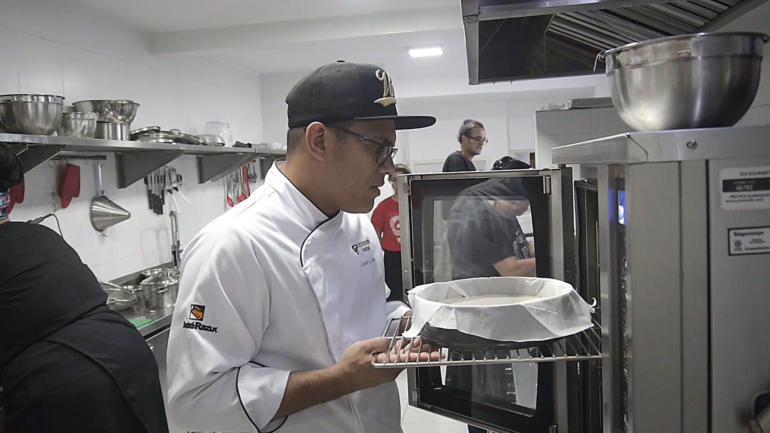Big cities around the world now have cuisine from every corner of the globe – from Chinese to Indian to Italian and American flavours. Brazil is no exception. Now one Brazilian chef is hoping to bring the simple homegrown cooking of his own country’s poorest areas to a wider audience, and at the same time change the lives of hundreds of apprentice cooks.
CGTN’s Stephen Gibbs tells the story of the Sao Paulo-based restauranteur Edson Leite.
Edson Leite was brought up in one of the favelas of São Paulo. Known also as the ‘peripheries’, the slums spread out from the affluent centre of the city.
A qualified chef, in 2016 Edson founded his own culinary school called Periphery Gastronomy and began teaching members of the community.
“When you put the words ‘gastronomy’ and ‘periphery’ together it shocks people. But there’s Italian, French, Japanese gastronomy, so why not periphery too?”
He created a new category of cuisine, ‘favela cuisine’, the food of the favela and called it Periphery Gastronomy. The course runs every weekday evening most of the year.
360 View: Chef rescues the flavors of Brazil’s “favelas”
Edson’s upbringing was difficult. He survived a murder attempt as a teenager, in a case of mistaken identity.
“To grow up in a favela in São Paulo isn’t easy. I’ve seen a friend being shot in the head, others being killed by mistake, one who had the same name as me. I had to carry my friend’s body out of an alley. These are very cruel things for someone who is 14 or15 years-old.”
Edson’s mother sent him to a school outside the favela. It opened his eyes.
“To be able to be in a different place from where you live, you see that things are different, the food is different, the space is different. And you come back to where you live and your friends are dying, drugs are around, the police are killing, and schools are like prisons.”
Age 21 and caught in the midst of what he says was like a war between drug traffickers, Edson decided to escape the favela and try his luck abroad. He’d been working as a DJ and sold all his musical equipment to pay for the flight.
“I knew nothing about cooking. We discover our cations. I don’t have a beautiful story, like my grandma or my mother were cooks. When I went, working in a kitchen was just a way to survive.”
Edson’s only previous experience in a kitchen had been working in his local McDonald’s. Yet within six years, he became an accomplished chef.
When he returned to Brazil, rather than getting a job in a top restaurant he chose to give people in his community the chance to become chefs themselves.
“Inside the favela everyone says that everything’s bad, and we believe that, so our self-esteem is wounded. So, something has to change and ‘Periphery Gastronomy’ helps in this process.”
Five hundred students have graduated from the course so far. The school funds itself through providing catering at events. The ingredients used are both donated and collected from restaurants and supermarket surpluses.
“The students, who may take up to three hours to get here, they all have a strong willpower to complete the course. We know everyone by name and their stories. They are not a number.”
Robson Mariano de Assis is one of the students Edson feels has most benefited from the course. He describes Robson as a 19-year-old, black, poor, gay, boy in a favela, with great talent.
“We empower this kid and give him training. It doesn’t interest us what he is, it interests us who he is.”
Robson is doing the gastronomy course. He says he’s very excited about baking and confectionery and thought to do the course.
“I’ve developed a lot, I’m calmer with myself, I’m able to understand others, I’m much more open than I was. I feel that I’ve grown a lot.”
Edson calls Periphery Gastronomy a social transformation through gastronomy, saying “I think that cooking is the least important aspect, looking after these people is what is important.”
 CGTN America
CGTN America
